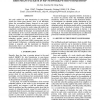Free Online Productivity Tools
i2Speak
i2Symbol
i2OCR
iTex2Img
iWeb2Print
iWeb2Shot
i2Type
iPdf2Split
iPdf2Merge
i2Bopomofo
i2Arabic
i2Style
i2Image
i2PDF
iLatex2Rtf
Sci2ools
ICMCS
2007
IEEE
2007
IEEE
An Investigation and a Preventing Strategy for the Redundant Packets in P2P Networks with Push Method
The push method for data transmission in peer-to-peer system has drawn great interest, since it can efficiently reduce the accumulated latency observed at user nodes. However, it can cause redundant packets more easily than the pull method, because the nodes using pull method can completely control the data request process while it’s not the case for push method. In this paper, we systematically study the distribution of the received redundant packets in push mode, and model it as a heterogeneous Poisson arrival. Both the theoretical analysis and the simulation show that the redundant packets caused by push method can be remarkable if the end-to-end delays among peers are not small enough. Furthermore, a redundant packets preventing strategy is proposed, and the experiment on PlanetLab demonstrates that it can effectively reduce the amount of received redundant packets.
| Added | 03 Jun 2010 |
| Updated | 03 Jun 2010 |
| Type | Conference |
| Year | 2007 |
| Where | ICMCS |
| Authors | Xin Xiao, Yuanchun Shi, Meng Zhang |
Comments (0)

